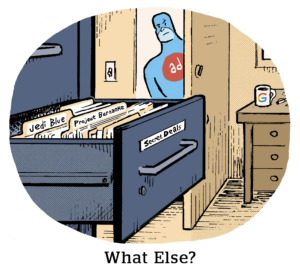 Ari Paparo is a longtime builder, explainer and sometimes lampooner of ad tech. And now he’s a CEO.
Ari Paparo is a longtime builder, explainer and sometimes lampooner of ad tech. And now he’s a CEO.
The former product executive with Google, Nielsen and AppNexus has taken the wraps off his new company, Beeswax, which provides a licensed “Bidder-as-a-Service” technology geared to two primary constituents: (1) ad tech firms, such as ad networks that are trying to get with the programmatic trend, and (2) in-house marketers doing the same. For these target customers, Beeswax aims to provide an alternative to building one’s own bidding technology.
Paparo founded the New York-based company along with two former Google executives, Shamim Samadi and Ram Kumar Rengaswamy. It employs seven engineers and has raised just over $1 million in seed money from a who’s who of ad tech founders, including former DoubleClick CEO David Rosenblatt, LiveRamp CEO Auren Hoffman, MediaMath CEO Joe Zawadski, Noah and Jonah Goodhart (CEO of Moat), FreeWheel CEO Doug Knopper and former MoPub CEO Jim Payne.
Additional funds came from SV Angel, Highland Capital, Revel Partners and RRE Ventures.
Paparo spoke with AdExchanger.
AdExchanger: What problem does Beeswax solve?
ARI PAPARO: I’ve been working in ad tech for a long time, and I’ve observed that overwhelmingly companies decide to build their own tech to bid on impressions on the buy side. When a company is innovating and growing, they want to have some control over the tech on the buy side. Building a bidder is 90% commodity work, and only 10% is innovative work that is interesting to the particular use case.
I saw companies wasting all this time taking on these huge multimillion-dollar projects to build their own bidders and it seemed like there should be a better way.
Who’s the target customer?
There are two types of customers. The first is what we call the ad tech natives. There are hundreds of companies out there who either are building their own bidders or want to build their own bidders. Those are the folks we’re talking to right now. These are ad networks, companies that support ecommerce and companies in the marketing tech world who want to get into ad tech. They all have an enormous amount of data and they’re looking to execute more efficiently.
The other type of customer is marketer direct. There’s this trend of marketers taking programmatic more into their own solution set. The next step, and it’s already happening, is that some marketers are going beyond putting their hands on the keyboards at a DSP and saying, “We want to own the whole tech stack, either for reasons of control, reasons of better use of first-party data or reasons of economics.”
Who’s in the competitive set?
Our No. 1 competitor is people building it themselves. A lot of folks build their own bidders. We’ve talked to over 100 companies in ad tech over the past year. Many build their own bidders and frankly have seen very poor ROI.
Secondary competition is some of the existing solutions. IPONWEB licenses their bidder for a very high price point. To disrupt that we’re offering a service that scales from very small volumes up to a very customized bidder.
Could this work with a customer’s existing DSP solution, or is it intended to replace the DSP?
It’s intended to replace it. The DSPs are mature solutions that are optimized for agency and advertiser use cases. Most of the customers we’re talking to are trying to innovate in some way. And that innovation could be through better understanding of your first-party data. It could be through new creative formats. It could be through new attribution models. We’re going after the customer who knows their business extremely well and is looking to make programmatic a natural extension of their core business.
A lot of ad networks frankly are still on their back foot when it comes to RTB. They either outsource it or they have homegrown solutions that aren’t scaling very well. That’s a big focus for us.
You describe Beeswax as “video first.”
Video is the fastest-growing area of digital, and it’s probably the most exciting. There is a lack of solutions that are appropriate for this market. If you’re in the market today looking for an API-driven, clean, transparent video-buying solution, good luck.
We saw that opportunity and decided to focus on video first. We expect to have a full-banner, mobile and in-game solution by fall.
What’s your revenue model?
This is one area of differentiation. When we’re talking about these sophisticated customers who in-source, they want their cost to flatten out as they grow. They want to get operating leverage from their investment in bidding. If you’re paying a percentage of spend, you can’t get that leverage. It scales exactly with your volume. Our model is we start with a percentage of spend for smaller clients, and then for custom bidder clients we charge on a cloud basis, similar to what you’d get if you were building your own bidder on Amazon Web Services.
How much do you charge?
It’s a work in progress.
How many customers?
We have a handful of beta customers.
Are you actively selling today?
Yes, we’re looking for folks who want to bid on digital video impressions.
What would you say is the size of the opportunity?
It’s a funny question. The first reaction, especially as we talked to some investors, was, “I don’t know how many people actually need a bidder.” And the second reaction from those exact same investors was, “Actually I know five people who are building a bidder right now.” We think the size of this opportunity is quite large.
Take the finance industry. What portion of the finance industry is controlled by people who are sophisticated and have their own tech, versus mainstream brokerage solutions like Charles Schwab? The answer is, every single major hedge fund had to build their own tech. The ad tech industry is going the exact same direction. People who are serious who have nine-figure budgets are going to want their own tech.
What’s the headcount?
We have seven, all engineers including myself.
How are you selling it if you’re all engineers?
Our investors have been a great source of leads. There’s a real lack of solutions. We’ve tapped into this vein where I’m getting referrals and calls every day.
When we talk again one to two years from now, what will you tell me?
We expect to have a wide variety of solutions in the marketplace, because by our nature we’re a cloud solution. People are going to build on top of us. I think several years from now, you’ll have some real innovation among our customer set. You’ll see a lot of our technology has been open-sourced and potentially adopted by other companies in the industry.
That sounds like Datacratic.
Yes, Datacratic has an open-source bidder called RTB Kit. We’re friends with those guys. We’re following a similar path. We think it’s not sufficient to open-source your bidder. You need to give your customers a complete solution. But the open-source bidder is one part of it. It goes hand in hand with our philosophy of a bidding platform. People want to build on a platform where they’re gaining equity from their investment. If they don’t own the core platform, they never leave that platform, they don’t have any portability and they don’t feel like they really own it.
Do you do supply integrations?
Yes, we integrate with supply. It’s one of the things everybody needs to do as part of an open bidder, and it’s another area that’s essentially a waste of time to do one at a time.
Every supply source has its own flavor of RTB. Getting up on that learning curve is a total waste of time for most people trying to do it. We integrate with the supply and then we give a standard Open RTB-compliant feed directly to the bidder in the cloud.
Is there a sell-side opportunity for Beeswax?
Absolutely. In talking to customers, there are many innovations that happen from the combination of sell-side liquidity with buy-side tools. We’ve had many people reach out to us. There seems to be a real demand in the market for what we’re doing as an open-source, technologically sophisticated, AP-driven SSP that doesn’t seem to exist in the market.
That could happen down the road. Right now we’re trying to focus.
Are you a DSP by another name?
A DSP is a bidder plus people. I’m not a DSP. We’re a bidder with a self-service approach.
Say a client asked you to do managed services. Would you?
No, we’re not going to do it. When we formed Beeswax, myself and my two co-founders, we put our heads together and said, “What do we stand for?” We stand for selling to the CTO, and building a cloud company in ad tech. And if it turns out the market’s not big enough, well that’s a shame. But we’re not going to become a DSP or do managed services.
What else?
It’s interesting to see the well-publicized downturn in people’s opinions about ad tech. I’ve been vocal on Twitter and elsewhere as a contrarian. Although ad tech has had few unicorns, it has an enormous number of exits in the 150 to 500 million range – probably more than any other sector. Over the last several years, there must have been more than 20 exits over $100 million, maybe more. That’s an extraordinary track record, and investors are certainly making their money back.
















